Futures Forum: On the River Otter: releasing beavers as part of the DWT's "groundbreaking project"
The Devon Wildlife Trust is overseeing the project:
Devon Beaver Project | Devon Wildlife Trust
River Otter Beaver Trial | Devon Wildlife Trust
Not everyone loves the beaver:
Eccentric baronet offers £1,000 reward to kill beavers on his estate because they are 'devouring' his trees - Telegraph
But the general public are very taken by the creatures, as reported across the national and international media:
Captivating pictures show they're back in our rivers - and DAM good at breeding: It's the beaver baby boom! | Daily Mail Online
Reduce flood-risk through rewilding, says new report from Rewilding Britain - The Ecologist
UK′s most talented architects are not human | Global Ideas | DW.COM | 04.10.2016
How beavers will transform the UK, AsiaOne World News
With a piece from the latest Herald:
Breaking news & sport in Sidmouth | Sidmouth Herald
This is very much part of the general 'rewilding' movement:
Futures Forum: Rewilding and rural communities: "The only reasonable argument to pay farmers £3bn in subsidies is ecological restoration."
With this piece from the Guardian earlier this year:
I'll be dammed! Beavers are Devon’s latest visitor attraction
After an absence from England of at least 500 years, beavers have been found living in the wild in east Devon. But the rodents aren’t keen on the spotlight
The farmer knelt down by one of the dead sheep and pointed to the tell-tale signs of a lynx kill. “Damn rewilding experts!” he growled. “These beasts are natural born killers. My kids don’t go outside any more.” As if on cue, the howling started: not lynxes, but the Devon wolfpack, in the shadows and hungry. The bears would be on their way too, no doubt. Raising their flaming torches, the farmers cocked their automatic rifles. “Them bears took a man off the high street in Budleigh Salterton last night. We’d best be getting back to the fort.”
OK, apologies for the Simon Pegg, Hot Fuzz-style melodrama, but this, some people might have you believe, is where rewilding ends up: that process of bringing back species that humans have previously eradicated, whether by accident or design. But all over Europe, like it or not, it has been happening.Wolves have been seen 40 miles from Paris, bison are back in Poland, and the lynx is on the rebound in Spain. And, rather than the scene sketched out above, what has happened is that people are eager to see the animals. Rewilding is bringing a worldwide tourist revolution to wildlife watching, with new tours appearing on the back of every campaign, be it Romanian bison, Tasmanian devils or Greek bears.
England was relatively untouched by the revolution until 2014, when a family ofbeavers was spotted living quietly on the Otter river at Knightstone Farm in east Devon. No one knows how they got there, but it’s the first time in more than 500 years that wild beavers had been seen in the country. That is how I came to be sitting on a log by that river at 11pm one night, listening attentively to every rustle and squeak in the darkness, imagining that crazy scene with the wolf, lynx and bear. Torch at the ready, I was hoping to catch a glimpse of the beavers, animals usually only sighted in the crepuscular twilight.
Earlier that day I’d been out with Steve Hussey from the Devon Wildlife Trust and scouted a stretch of river near Ottery St Mary, about eight miles from the coast. In an oxbow lake on land owned by farmers David and Vicki Lawrence, we had found traces of the animal – trees gnawed off at the base – but nothing like lodges. “They don’t always build dams or lodges,” said Steve. “On fast-flowing water, they can utilise old otter holes in the bank. They can be discreet – not easy to spot. The best months are July and August.”
After their discovery in 2014 the river Otter beaver community expanded rapidly to a dozen, and has now been augmented with two outsiders to expand the gene pool. Traces of beaver activity have been recorded all along the river, right up to the headwaters 20 miles away in Somerset. So far, tourist benefits have been small, but local pubs and restaurants report increased trade and people enquiring about the animals. The more important benefits, perhaps, will be environmental. Beavers create opportunities for all sorts of fish, amphibians, insects and plants to flourish. One study by Exeter University reported that frog populations quadrupled in areas where beavers lived. Initial results in Devon show the beavers helping increase insect life and consequently bat populations. The animal is one of a few exceptional creatures that have an extraordinary impact on other wildlife.
That first night, however, I had no luck. All I spotted were two other wildlife-watchers creeping towards me, wondering what kind of a beast I might be. When I stood up, they ran away shouting, thus ending any hopes of seeing wildlife.
Fortunately a trip to east Devon does not rely on fickle wildlife to make it worthwhile. I walked or swam most of the river length from Ottery St Mary down to the sea, discovering en route an excellent pub in Tipton St John (the Golden Lion), a wonderful cafe-restaurant-arts centre at Otterton Mill, and a great fish and chip shop in Budleigh (the Premier Café on Chapel St). The river is an idyllic stream with plenty of spots to stop and swim or just watch the kingfishers zipping past. Close to Ottery St Mary I watched a woodpecker chick poke its head out of a hole in a beech tree, nagging its parents to fetch more grub.
A mile’s walk east from Otterton Mill is Ladram Bay, a geological marvel hidden behind a massive caravan park. To avoid a £5 charge you’ll have to park at the top and walk down to the beach. It is worth it and there are kayaks to hire.
Right at the end of the river Otter, hemmed in by red cliffs, is Budleigh Salterton. The river mouth has a nature reserve with bird hides. Walking down to the sea there, I discovered the rising tide forcing its way upriver and could not resist jumping in to ride the current upstream. In the water, cruising under the surface like a submarine pack, were some big grey mullet.
Back at Knightstone Farm I asked David Lawrence, the farmer, how he felt about the beavers being discovered on his land. “By coincidence we had just built our first glamping safari tent close to where the beavers were found,” says David, “so they’ve brought us a few visitors and not caused any problems at all.”
The main objections, initially at least, came from anglers who had not realised that beavers were probably more interested in their wooden fishing stools than any fish, since they are entirely herbivorous. This year there have been sightings around Otterton, which is worth the six-mile walk downriver from Ottery St Mary anyway, because it is so beautiful and there is plenty of other wildlife to watch out for, including otters.
On my last night I went out again and spent a lovely, tranquil couple of hours, sitting in the gloaming, staring at the stars. I did not see beavers, but I didn’t mind. It was sufficient to know they were out there, gnawing away at those English willows for the first time since Henry VIII sat on the throne.
I'll be dammed! Beavers are Devon’s latest visitor attraction | Travel | The Guardian
.
.
.

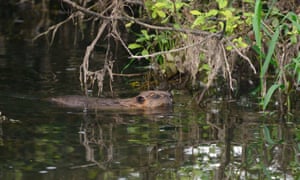
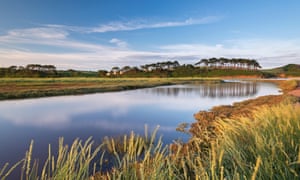
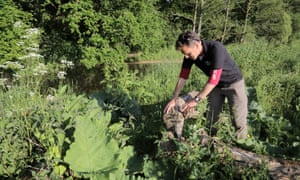
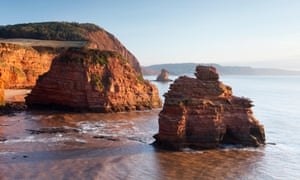
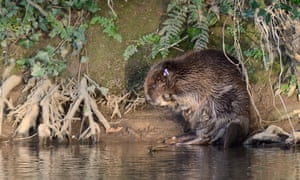
No comments:
Post a Comment